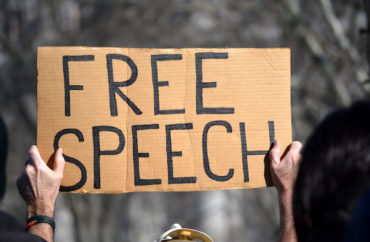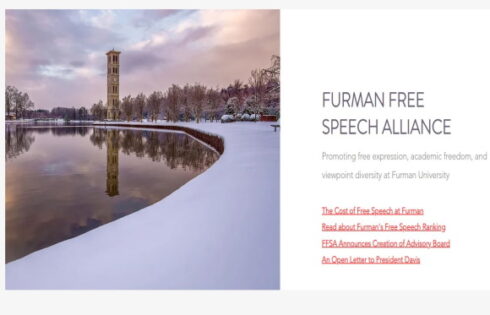
FIRE highlighted the flagship university’s poster policy as particularly restrictive
The University of South Dakota has not responded to a letter the Foundation for Individual Rights and Expression sent over three months ago outlining how a university policy “restricts students’ speech rights.”
“No, we have not received a response from the university,” FIRE Program Officer Mary Griffin told The College Fix in a recent email. Communications Campaign Manager Katie Kortepeter confirmed Tuesday that FIRE has still not received a response.
Each month, FIRE flags a college or university policy that unacceptably limits free expression on campus. The organization chose USD’s “Poster and Advertising Policy” as its “Speech Code of the Month” for Aug. 2023 “because it restricts student expression on campus and is USD’s only policy that restricts student speech,” Griffin told The Fix.
In its July 10 letter to university USD President Sheila Gestring, FIRE outlined four ways the university’s poster requirements could restrict speech on campus. Its restrictions include requiring an organization to sponsor all posters and stipulating the signs could not be put up anonymously.
“Individual students and groups alike must have the opportunity to post anonymous written materials pertaining to topics other than events in at least some designated areas of the campus,” the letter stated.
“Students may wish to share their views anonymously because they fear retribution from the university for posting something critical of the administration, or because they fear disapproval from their peers for posting an unpopular political opinion,” FIRE wrote in an Aug. 3 news release announcing the USD “Speech Code of the Month,” which it called an “ignominious honor.”
“There must be at least some designated areas on campus for students to engage in this critical form of expression, which the Supreme Court has affirmed is ‘an aspect of the freedom of speech protected by the First Amendment,'” FIRE continued.
The published USD policy states that “all signs must display the name of the Officially Recognized Organization that is sponsoring the promoted activity.” The document was “last revised” Sept. 19, 2019.
The Fix asked Emma Thompson, USD’s director of student rights and responsibilities, if USD had reviewed the policy in response to the letter from FIRE. Thompson referred The Fix to Hanna DeLange, USD’s public relations strategist. DeLange did not respond to a request for comment.
Kristin Berger, a representative from the South Dakota Department of Education, declined to respond to The Fix’s questions as to whether or not the policy violated any free speech laws or policies of the South Dakota DOE.
FIRE awarded “Speech Code of the Month” to another USD policy in June 2017.
“Not only are USD’s ‘Guidelines for the Awareness and Prevention of Acts of Cultural Insensitivity and Bullying at USD’ written in a tone more appropriate for schoolchildren than adult college students, they also make clear that protected speech may be subject to punishment at the university,” according to a FIRE news release published at the time.
For example, the policy prohibited the online expression of “feelings of hatred.” However, “USD cannot prohibit students from expressing feelings that administrators subjectively view as ‘hatred,’ most of which are entirely constitutionally protected,” FIRE wrote.
Despite its restrictive policies, the university has committed to upholding students’ Constitutionally protected free expression on a public university campus.
In 2018, the South Dakota Board of Regents adopted a modified version of the “Chicago Statement” on free expression, The Fix reported at the time. The Board of Regents said would “express the Board’s commitment to the principles of expression protected by the First Amendment to the U.S. Constitution.”
“The ‘Chicago Statement’ is a model free speech policy statement that many universities have adopted, affirming their commitment to free expression,” FIRE wrote.
More than 100 universities, including the University of South Dakota, have adopted or endorsed the “Chicago Statement” or a similar set of principles.
The “Chicago Statement,” published in 2014, “guarantees all members of the University community the broadest possible latitude to speak, write, listen, challenge, and learn.”
“Except insofar as limitations on that freedom are necessary to the functioning of the University, the University of Chicago fully respects and supports the freedom of all members of the University community ‘to discuss any problem that presents itself,” it continued.
MORE: Pitt conservatives call on chancellor to fix free speech problems
IMAGE: Christopher Penler/Shutterstock
Like The College Fix on Facebook / Follow us on Twitter





Please join the conversation about our stories on Facebook, Twitter, Instagram, Reddit, MeWe, Rumble, Gab, Minds and Gettr.